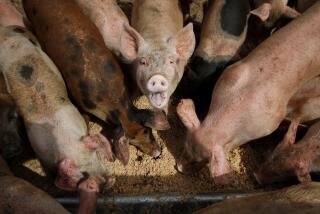Judge Rules Against Fees for Beef Marketing
- Share via
ABERDEEN, S.D. — A federal judge has ruled that fees collected for the “Beef: It’s What’s for Dinner” advertising campaign violate the free-speech rights of cattle producers, in the latest case in a long-standing dispute among farmers.
U.S. District Judge Charles B. Kornmann ordered the government to stop collecting the fee of $1 per head of cattle, which amounts to about $88 million per year, to fund the research and promotion campaign. The order takes effect July 15.
“I am disappointed by the ruling,” U.S. Agriculture Secretary Ann M. Veneman said in a statement. “We are consulting with the Department of Justice to determine the next steps.” The department could seek an injunction to permit fee collections beyond July 15.
Farmers have complained for years that forced funding of pitches for products ranging from California raisins to milk to cheese violates their rights to free speech.
A Supreme Court decision last year put advertising campaigns for agricultural products further in doubt, ruling that farmers should not be forced to fund generic marketing campaigns. Though the case involving mushroom growers in Tennessee resulted in a 6-3 ruling, the effect on disputes elsewhere was unclear.
In 1997, the court sided with growers of California peaches and nectarines, who disputed charges to pay for a series of ads touting the fruit. California has its own programs for promoting farm products. Kornmann ruled Friday that the 1985 Beef Promotion and Research Act is unconstitutional, because “beef producers cannot be compelled to finance advertising programs with which they disagree,” according to Billy Perrin, president of the Kansas City, Mo.-based Livestock Marketing Assn. The association, joined by nine ranchers and other groups, challenged the law.
The decision affects up to 1 million U.S. farmers and ranchers who raise cattle. Last year the sale of cattle and calves generated $40.4 billion in income, or 20% of the $202 billion in U.S. agricultural sales. Most opposition to the program is from small ranchers; larger producers support it.
Perrin, a rancher and livestock dealer from Hugo, Okla., said the advertising campaign made “no distinction between U.S. and foreign beef,” and that restaurants or grocery chains also benefited from the promotion at the farmers’ expense.
The Agriculture Department, which has allowed farm cooperatives to market various products since the Great Depression, regards all such programs as useful tools to help boost consumption of farm products.
“The beef promotion program in particular has helped beef demand to increase and has contributed to U.S. beef exports,” Veneman said.
The National Cattlemen’s Beef Assn., a Colorado-based trade group that supports the promotion fee, was not available to comment Sunday.
More to Read
Sign up for Essential California
The most important California stories and recommendations in your inbox every morning.
You may occasionally receive promotional content from the Los Angeles Times.













